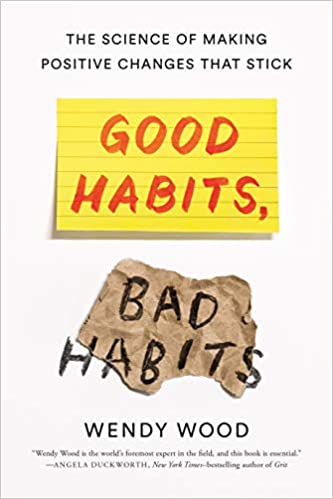«Nuestros hábitos suponen una manera de suceder las cosas, una vaga coherencia del mundo» (Adolfo Bioy Casares)
Habits govern much of our daily activity and we perform them without conscious decisions: we operate in a kind of automatic mode according to behaviors learned over time.
This is one of the main theses you will find in the book “Good Habits, Bad Habits” by psychologist Wendy Wood, a researcher and professor with extensive experience in this field.
I would not include this book in the category of “self-help”, in the sense that it offers us multiple recipes for the creation or modification of habits. Although there are recommendations, they are rather generic, with some specific examples to understand them.
It is more of a psychology essay – in the style of D.Kahneman’s “Think Fast, Think Slow”- written for a generalist audience with an accessible language. It describes our “habitudinal self” (as opposed to the “conscious self”) and explains how habits work, how they are acquired, what makes them successful or failed, all based on multiple investigations referenced throughout the work.
I have found interesting ideas, such as dismantling the myth of willpower as an effective formula for changing our behaviour in the medium-long term, apart from issues that I knew about (or at least intuited), but which you understand better after the analysis carried out by the author, such as the driving forces, rewards and frictions and the role they play in our habits.
To criticize something, I would say that some topics become a little repetitive or perhaps they could have been presented and analyzed with less extension without losing clarity and rigor, but in general it is a book that I liked and found useful.
Have I applied any teaching after reading the book? Well, the main thing has been a general review of habits and routines to try to improve them (it’s always good to have an ‘audit’ every few months), apart from coming up with some tricks for specific issues that I didn’t like the way they were ‘working’ in my daily life.
A small example: I usually read several books in parallel, and this dispersion makes it difficult for me to continue with the most demanding ones. Sometimes I leave them half way through because as time goes by it becomes more difficult to pick them up again. Nowadays, if I am interested in a “difficult” book, I keep it open on a portable desk stand (if it is in paper format), next to the computer where I spend lot of time. Having it continuously in view and being able to continue reading immediately at a time when I want to rest, change tasks,… encourages me to continue with it. This reduction of “friction”, even if it is small, has meant a significant change and has made me quit fewer books and even read more in general.
Note: I finished this book before the whole issue of the coronavirus and the restrictions we have. Perhaps now it will be even more useful for those who have had to radically change their routines and it can help them to create new habits that are beneficial for their lives. Take courage and take good care of yourselves!

Comments